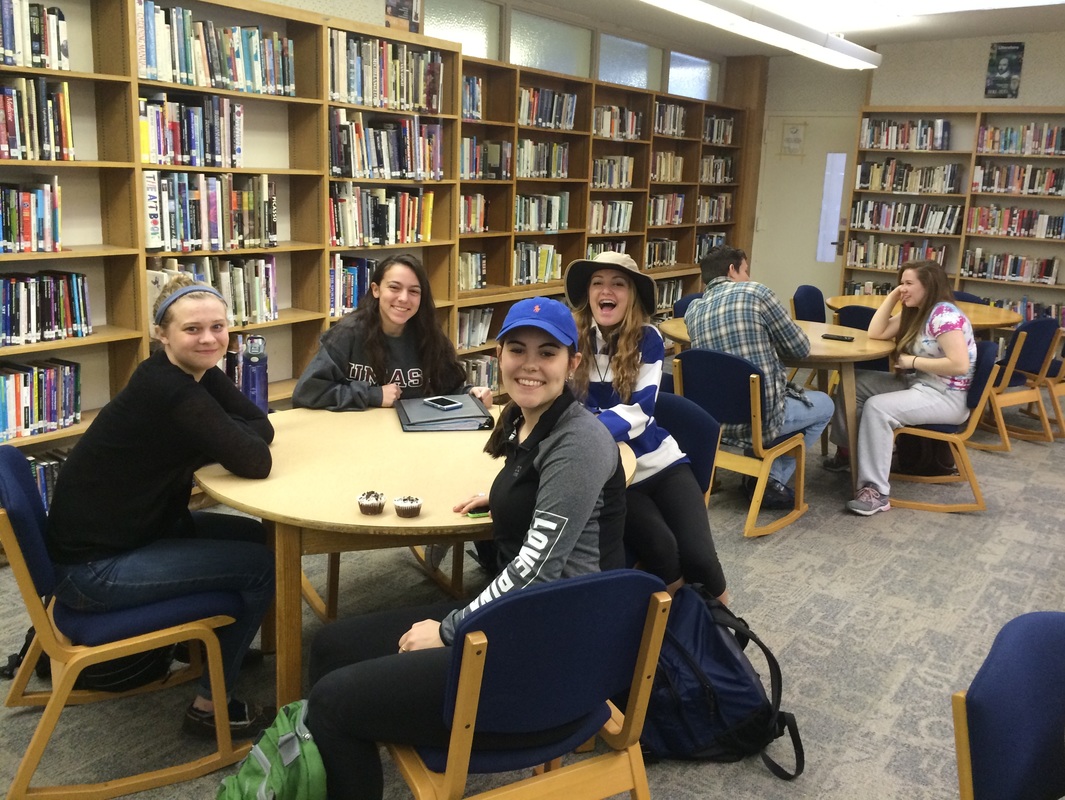|
Colleen Simpson is the Library Media Specialist at Lester J. Gates Middle School in Scituate, MA Middle school is a complex time for students, developmentally, socially, academically, you name it. As a middle school librarian, it can feel like walking a tightrope to balance students’ interests and needs while curating a quality collection. And there is no one model for middle schools, even a tiny sample of MSLA librarians revealed six different school grade ranges, the most common being K-to-8, 5-to-8, and 6-to-8. While none of us have all the answers, there is comfort in knowing we all feel the unique challenges of this level.
0 Comments
Colleen Simpson is the Library Media Specialist at Lester J. Gates Middle School in Scituate, MA
I have a confession, I love research. I mean I really love discovering the answer to something, but, even more, I love the hunt. I love the process. I love finding an answer for myself and for other people. I even love the humbling feeling of learning that what I thought I knew was either incomplete or totally incorrect. And what I love most of all: there is always more to discover about any subject.
This may seem obvious. One typically assumes that librarians like research, but like most educators I think a lot about my own motivations when considering the student’s motivation. This balance is particularly challenging in middle school when there is less extrinsic motivation than high school. As a staff we are regularly talking about what drives a student, where their interests lie and how we can harness that motivation into the classroom. Secondary Column: Notes from the Middle: Helping relieve students from the paradox of choice10/18/2022
Colleen Simpson is the Library Media Specialist at Lester J. Gates Middle School in Scituate, MA
Picture it, it’s time for a whole grade level to pick out independent reading books. They come to your library in droves. As they arrive at the circulation desk some have already found the book they want, others just need a physical direction, and some just want to browse. And then there’s this student:
7th grader: I need a book? Me: Okay, did you have one in mind or are you looking for suggestions? 7th grader: I’m just looking for fiction books. Me (with a smile): Great, we have a lot of those. What have you read that you’ve liked in the past? 7th grader: I don’t like to read. Me: Okay, so what book was okay for you? Meaning you were able to get through it and it was kind of, sort of, not that bad? Was it fantasy or magical? Did it have some history to it? Do you like mystery? Sports stories? What about a story that feels like it could happen? 7th grader: I don’t know, just like fiction. And repeat. Sound familiar? There’s myriad reasons why students don’t know what they want and while it is our job to unpack it, this is not always an easy task. Secondary Column: Notes from the Middle: Teaching Middle School Media Literacy on a Fixed Schedule5/17/2022 Colleen Simpson is the Library Media Specialist at Lester J. Gates Middle School in Scituate, MA We are few and far between, but there are a handful of us out here in secondary ed. library land that teach on a fixed schedule. I’ve read so often that a flexible day is best for librarians, and often thought about what my position might look like if I was able to push into classrooms regularly. I do, however, fully embrace my role in the specialist rotation as I see every student in courses twice throughout their time in the building and I give direct instruction in information literacy, news literacy and media literacy.
My course is called Research Media Projects and appears on student schedules as RMP, which is how we refer to the class. We are on trimesters and students take RMP for half of one of those– a six week schedule we call a minimester– in both 7th and 8th grade. It is part of their regular specials rotation and, as I often am asked by other middle school librarians, all student assignments are graded as they are in all specials. Francesca Mellin is the Head Librarian at The Pike School in Andover Wordless picture books are the ultimate example of “show, don’t tell.” Artists using this format have fewer constraints (no blocks of text to plan around) but also the greater responsibility of creating characters and advancing plot solely through visual means.
Colleen Simpson is the Library Media Specialist at Lester J. Gates Middle School in Scituate. After a year and half we are as close to normal as we have been since that fateful day in March 2020 when schools shutdown. Our district spent three quarters of last year hybrid before students all returned in person mid-April. It was great to have everyone back at the time, students were excited to see friends, and school is just easier in person. This year many of the parameters have been lifted and, with exception of masks for everyone and a lunchroom with desks instead of tables, things look about where they should be. While our schools across the state may look different, I would imagine many of us are having similar experiences.
Felicia Quesada Montville is the Library Teacher at Charles E. Brown Middle School in Newton, MA. While we are still in the midst of what feels like a never-ending year, September will be here before we know it. The optimist in me sees a blur of back-to-back library orientations, a flurry of check outs as students select their first independent reading books of the year, and sessions training student library helpers. Banned Books Week (September 26th through October 2nd this year) so often sneaks up on me, but at least ALA’s amazing graphics make it easy to put up an engaging and informative display.
Callie Graham is the Teacher Librarian at Burlington High School and a 2020 recipient of the MSLA President's Award. Why Do Schools Need Social Emotional Learning (SEL)? Struggling with a global pandemic, an economic recession, and racial injustices and disparities, today’s students and teachers face overwhelming fears and anxieties that negatively influence mental health and learning (CASEL, 2020; Cipriano, Rappolt-Schlichtmann, & Brackett, 2020; Shafer, 2020). Consequently, “the compounding traumas of this crisis call for schools to rethink what it means to educate the whole child and invest deeply in SEL” (Cipriano, Rappolt-Schlichtmann, & Brackett, 2020, p.6). Felicia Quesada Montville is the Library Teacher at Charles E. Brown Middle School in Newton, MA, and the winner of a 2020 MSLA Web Seal of Excellence. When I sat down to write my first Forum article back in January, I brainstormed a list of topics, settling on two for my winter and spring articles. Little did I know that my first article’s topic, using social media to connect with students, would suddenly become even more relevant as we moved to connecting with students solely online. Nor did I realize that my second idea would need to go right out the window — what help is an article about genrefying a collection when no one can access their libraries? Back to the drawing board it was.
And while there’s no shortage of pieces out there highlighting the amazing things people are doing from home, life in quarantine is simply all I could wrap my head around. What does middle school librarianship look like from home? Much of our time connecting with students in school is during unstructured extension blocks — the library is the heart of the school, a gathering place in addition to a classroom. How do we recreate that safe space online? And while our libraries are about so much more than the books and the lessons, there are also the books and the lessons! How do we ensure that our students keep reading and learning important information literacy skills?
Emily Remer is the Librarian at Michael E. Smith Middle School in South Hadley, MA.
Librarians have long been promoting diversity in library collections. We understand that diverse books make for stronger and more socially valuable collections. Woke books (#ReadWoke), as part of diverse collections, are increasingly recognized as essential to libraries and schools because of their particular focus on marginalized and repressed groups, and because of the influence they can have on the reader in waking them up to injustice – reading diverse and woke books can help readers (students, librarians, teachers, and everyone) develop respect and empathy for others, feel like they have a place in the world, become aware of inequalities and biases, and understand today’s complicated societal issues. These books can also provide a good jumping-off point for some of those difficult discussions that youth and adults often need to have.
Felicia Quesada Montville is the Library Teacher at Charles E. Brown Middle School in Newton, MA. The social media landscape is wide and varied: Millennials posting too many pictures of avocado toast and claiming a color as their own. Gen Z unknowingly giving their data to Chinese tech companies. Boomers and snowflakes at war over who is most at fault for what is wrong in the world. Celebrities oversharing and doling out unsolicited advice. The tweeting Commander in Chief. Oh, and the cats. So many cats. There’s no doubt that social media has impacted our society and how we interact with each other on a daily basis, and debates over whether those changes are positive or negative persist.
The debate around the impact of social media is fiercest in regards to its use by tweens and teens. The Wait Until 8th pledge, a parent commitment to no smartphones before 8th grade, is gaining traction as the negative impacts of smartphones on interpersonal relationships, academics, and more have come to light. At the heart of many of these arguments is access to social media. Cyberbullying, sleep disruptions, and increased anxiety and depression are real risks of social media use, especially when use is excessive. But regardless of the risks, social media is here to stay — the power of connection and the spread of information is too strong. Therefore, we should take advantage of this powerful tool to forge connections with both students and stakeholders. Pamela Vallée is the library media specialist at Lunenburg Middle-High School and a recipient of a 2019 Web Seal of Excellence Award. Four years ago Lunenburg built a new school containing a high school and a middle school, and a beautiful shared library. As the teachers packed up classrooms and I packed up the high school library, I learned that I would be the only person staffing the new school library. I spent many days that summer researching best practices for managing a combined middle and high school library, visualizing where I should place the middle school and high school book collections to promote usage, and then shelving all of the books and supplies. I relabeled and barcoded all of the middle school books to make them easy to find in the shared online Destiny catalog. I organized the middle school fiction collection into genres, and began color-coding the books and creating signs. I assumed I would be very busy with seven grades of students and teachers needing my attention, and hoped that genre organization would help students find a good read.
Sarah Forfa is the School Librarian at West Springfield High School. She also serves on the MSLA Executive Board as Co-Director for the Western region and was the recipient of a 2018 President's Award. How many times have you stood in front of a group of students at the beginning of a school year, and watched their eyes glaze over as soon as you begin your tried and true “Welcome to the Library” presentation? Orientations are an essential part of our work as school librarians. How can we expect students and faculty to take advantage of all our great resources if they aren’t properly introduced to the library? Although necessary, we all need to face the fact that traditional orientations aren’t always the most engaging of activities for us or our students. A poorly planned, boring, or overly detailed orientation has the potential to turn students off from the library in one fell swoop. In turn, we may come away from the experience feeling disheartened and disconnected from our students - which is the opposite of our goal. So the question becomes…. how can we make orientations more interesting and successful for everyone involved?
Zoe Keenan is the Library Media Specialist at Frontier Regional School in South Deerfield. My school has struggled with summer reading for many years now. It’s been a pull and push from both the English Department, the Library and the Administration on expectations of what students should read, how they should be assessed on it, and what culminating event should we do to wrap up the program?!?!
When I started at my school three years ago, all three departments had separate ideas about what makes a successful summer reading program. The Administration wanted results and proof of assessment, the English department wanted students to read a wide variety of eclectic books and, as the new Librarian, I wanted students to enjoy reading again. I remember getting to know the students during my first year and asking them how they liked the summer reading book. Many hadn’t read it, since they knew from past years that there was no assessment to be passed in or graded. Of the handful who read it, mistakenly thinking they would be tested on it, only a few enjoyed it. I remember thinking that it was going to take some time and lots of effort to change this program around. Liz Percy is the Librarian at Westwood High School and received a 2018 Web Seal of Excellence Award. Yearly, as high school librarians we assess our 9th grade students’ entry level research skills, and focus on advancing their competencies through their four years with us. Yet, after our students leave us they go on to the world of college research. What skills should we emphasize to get them ready for life after graduation?
In 2010, having always had an interest in the research continuum, I posted a message to the Infolit listserv, asking college librarians, “What do you see as your college freshmen’s strengths & weaknesses? How can I better prepare my high school students for college research?” Apparently, this struck a chord, and I got a barrage of replies. Zoe Keenan is the Library Media Specialist at Frontier Regional School in South Deerfield. I can’t tell you enough how important critical thinking skills are in this day and age. These skills apply to all aspects of life from reading the newspaper or watching TV to having a conversation. In this day and age, we need to evaluate the information in front of us and ask questions to find its relevance, reliability and to understand the deeper meaning behind the resource. Teaching these skills, though, can be challenging in a world where classes are measured by assessments and data driven. How do we assess critical thinking skills when the whole process is about thought patterns and analyzing how people think? How do we teach these skills when we only have 45 minutes with a class?
Allegra D'Ambruoso is the Library and Technology Director at Boston Arts Academy
and is a recipient of a 2017 MSLA President's Award. Being a librarian is a thankless job; being a school librarian is even worse. Reason 1: Early Mornings. The school day starts anywhere from 7am until 9am; but of course, teachers (including you!) have to be there before classes start. This means that if your school starts at 8am, you should probably be there by 7:30 or 7:45 at the latest, or else students will be lined up outside your library door, impatiently waiting for you to show up and let them in. These kids will be the kids who need to print an assignment for their class that starts at 8 (“Well, Miss, you see, what happened was...”); or who simply must tell you about their newest break-up; or who want to get your advice on what color they should dye their hair next. These kids are often the most needy kids; you’ll often realize that they need snacks, breakfast, juice, gloves, and a hug. They’re some of the best kids to get to know. They’ll be willing to help you shelve books, talk about new books to order, and always know when you need a compliment to cheer you up (“Miss, did you cut your hair? It’s cuuuuuute!”). Accept that you are one of the reasons they come to school; that you might be the most understanding adult that they know; and realize that you are going to cry when they graduate. Bethany Dunton is the Librarian at Auburn High School and received a 2017 President's Award. 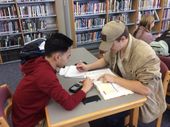 One on one tutoring in the AHS Library One on one tutoring in the AHS Library I am the librarian and National Honor Society (NHS) co-adviser at Auburn High School (AHS). As co-adviser to the NHS students for the past 10 years, I have received many requests for tutoring support. For years, tutoring was only considered to be an after school thing, which often conflicted with the availability of the NHS students. Usually the NHS students are the ones who are overbooked with activities, sports, and work, so, in reality, tutoring did not happen often. Additionally, it has only been within the past four years or so that AHS offers the daily 30 minute directed-study, which is critical to the success of the program. What started out as my Professional Goal a few years ago has turned into a staple for the AHS students. Four years ago, I asked the NHS members if they would tutor during the directed-study period. This was purely optional, and still is to this day. The NHS students receive volunteer credit, and the students who wanted help would receive the extra support. That first year, we had a total of 75 partnerships. In my eyes, the program was a success from the start, and it has just grown from there. This school year, during the first trimester, we had 42 tutoring partnerships. (AHS is on a trimester schedule, so I track student usage of tutoring services by trimester.) The program is growing! Zoe Keenan is the Library Media Specialist at Frontier Regional School in South Deerfield One thing they do not teach you in library school is how to adjust your practice to fit the latest technology. It is the age of the Chromebook and I am meeting my match.
Chromebooks allow students to access the internet, explore databases and download eBooks, audiobooks and more. Our school has recently switched to a one-to-one program where every student has a Chromebook to use at school. This has been a wonderful step to teach all students technology skills and provide access to the internet for all of our students. Students can now access numerous learning tools for the classroom and resources without even stepping into the library. You now see my problem, right? Our students grew up with technology, but that does not mean they use it responsibly or appropriately. Skills on using online tools, web searches and databases are key skills that need to be honed, but with Chromebooks being ever present, it is easy to assume that students already know these skills. Chromebooks can be a wonderful addition in the classroom, but teachers have to remember that this digital generation still needs to teach lessons on technology and research skills. Margaret Schoen is a Library Teacher at Newton South High School Our school system signed up for a new citation tool this year, NoodleTools. It’s been an interesting year as we’ve tried to convince our teachers to climb on board with a new tool while discovering its features and surprises ourselves.
Switching over to a new system was not entirely a choice - the company we had previously been working with was purchased, and we needed to find a new solution fast. So when we signed on to NoodleTools we knew we were getting something that did the basics of citations, but we’ve also discovered some tools and tricks that have been especially useful to our students. Susan King and Paula Myers are Teacher-Librarians at Lincoln-Sudbury Regional High School and recipients of a 2017 MSLA Web Seal of Excellence 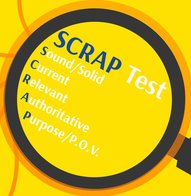 We want to share a source evaluation tool that we developed along with two teachers from our school. Our moment of inspiration came during the excellent July 2015 workshop, Are You Research Ready? (facilitated by Pam Harland and Rachel Small). In discussing how the library taught evaluation, we explained to the teachers in the group that we did so as needed, sharing questions that students should consider or pointing them to websites that could help. But we librarians were interested in developing a more formalized system for teaching source evaluation at our school—one that teachers would be comfortable sharing in their classrooms. We were aware of some tools and acronyms that other folks used and decided to build on that work to create another system. Our intent was not to reinvent the wheel; we were just being realistic about what our teachers would get on board with and be willing to share with students (much as students might like the CRAAP test acronym, we knew that some of our teachers would not go for that). By Anonymous 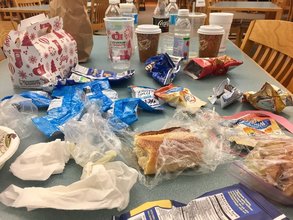 A typical day’s trash in our “No Food Allowed” library A typical day’s trash in our “No Food Allowed” library Every September the school nurse at our high school announces that we have a new student with serious, life threatening allergies and that no food will be allowed in any classroom. We wonder who this student is so we can be mindful. This student could go into anaphylactic shock in the library. I’ve practiced plunging an epi pen into an orange just like everyone else, but I do not want to do this in real life. When the announcement is made, we acknowledge that we have not officially allowed food in the classrooms for years, yet every year we have food in the classrooms, the hallways, in the library, in staff offices. Administrators stock large urns with candy to lure students into their gingerbread houses. We’ve seen our principal walk down the hallway with the urn in his arms, a smile on his face. But, no more. This year it will be different. This year we mean it. 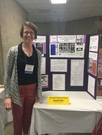 Deeth Ellis is a librarian at the Boston Latin School and a winner of the 2016 Super Librarian award Overview of Approach
As the librarian who works with the science department, my work to support and build collaborative projects with the science teachers has been multi-faceted. Some of the work has yielded successful collaborations and integration of essential skills into the student learning. However, a lot of my efforts have not yielded consistent results yet. The challenges are hard and require fundamental changes in collection development practices and information literacy skills to determine how the library can be relevant to students in science. My approach has been to look within Boston Latin to see what is being taught, talk about ideas and to build relationships with teachers as well as looking outside of the Boston Latin for new ideas. Within, I have looked at our print and digital collections, had many conversations with teachers, offered professional development, and pursued collaborations. Outside, I have attended a week-long Teaching with Primary Sources in Science workshop at the Library of Congress, presented at Massachusetts Association of Science Teachers, and reached out to higher education science librarians. Pamela Vallee is a Librarian at Lunenburg High School in Lunenburg, MA and a winner of a 2016 Super-Librarian Award I realize it is difficult to capture what I do each day. Every morning before I leave my house, I open the library schedule to check which classes are coming and gauge what the day might bring. But as organized as I try to be, I never know who will need me. Some days I am tied to my desktop computer trying to answer research or technology questions or make important updates to the website. Some days I am literally running back and forth across the library trying to help two or more classes at the same time. Some days I feel like a traffic cop directing students to open tables or available computers. Some days I discover that I need to be an emergency substitute and absorb extra classes into the library. Some days I am in other parts of the school assisting teachers and students with technology problems. In addition to the daily demands, I just finished teaching my first online PD course and need to create the next one. And our current high school will be torn down in a couple of months, so I have been weeding, organizing, packing and planning for the move into the new building and need to pack up everything in the library soon.
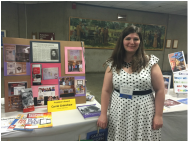 Carrie Grimshaw is the Library Media Specialist at Leicester High School and the recipient of a 2016 President's Award As a Library Media Specialist for Leicester High School, I make myself invaluable to faculty, staff, and students by constantly striving to improve my school library program by being on the forefront of technology. As a technology leader in my high school, I attend workshops and teach best practices to faculty about Chromebooks and library updates, teach research database lessons to students, and create a fun place with interactive displays and makerspaces where students can hang out. Technology is a huge part of what school libraries are now and technology needs to be embraced in order for your school library to remain hub of your school community.
|
Forum NewsletterCo-Editors
|

